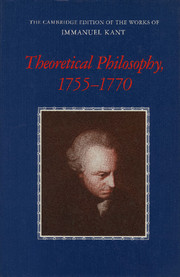Book contents
- Frontmatter
- Contents
- General editors' preface
- Preface
- Guide to abbreviations
- General introduction
- Introductions to the translations
- Résumés of the works
- A NEW ELUCIDATION OF THE FIRST PRINCIPLES OF METAPHYSICAL COGNITION (1755)
- THE EMPLOYMENT IN NATURAL PHILOSOPHY OF METAPHYSICS COMBINED WITH GEOMETRY, OF WHICH SAMPLE I CONTAINS THE PHYSICAL MONADOLOGY (1756)
- AN ATTEMPT AT SOME REFLECTIONS ON OPTIMISM (1759)
- THE FALSE SUBTLETY OF THE FOUR SYLLOGISTIC FIGURES (1762)
- THE ONLY POSSIBLE ARGUMENT IN SUPPORT OF A DEMONSTRATION OF THE EXISTENCE OF GOD (1763)
- ATTEMPT TO INTRODUCE THE CONCEPT OF NEGATIVE MAGNITUDES INTO PHILOSOPHY (1763)
- INQUIRY CONCERNING THE DISTINCTNESS OF THE PRINCIPLES OF NATURAL THEOLOGY AND MORALITY (1764)
- M. IMMANUEL KANT'S ANNOUNCEMENT OF THE PROGRAMME OF HIS LECTURES FOR THE WINTER SEMESTER 1765 — 1766 (1765)
- DREAMS OF A SPIRIT-SEER ELUCIDATED BY DREAMS OF METAPHYSICS (1766)
- Preamble, which promises very little for the execution of the project
- The first part, which is dogmatic
- The second part, which is historical
- CONCERNING THE ULTIMATE GROUND OF THE DIFFERENTIATION OF DIRECTIONS IN SPACE (1768)
- ON THE FORM AND PRINCIPLES OF THE SENSIBLE AND THE INTELLIGIBLE WORLD [INAUGURAL DISSERTATION] (1770)
- Factual notes
- Bibliographies of editions and translations
- Glossary
- Biographical-bibliographical sketches of persons mentioned by Kant
- Index
Preamble, which promises very little for the execution of the project
Published online by Cambridge University Press: 18 December 2014
- Frontmatter
- Contents
- General editors' preface
- Preface
- Guide to abbreviations
- General introduction
- Introductions to the translations
- Résumés of the works
- A NEW ELUCIDATION OF THE FIRST PRINCIPLES OF METAPHYSICAL COGNITION (1755)
- THE EMPLOYMENT IN NATURAL PHILOSOPHY OF METAPHYSICS COMBINED WITH GEOMETRY, OF WHICH SAMPLE I CONTAINS THE PHYSICAL MONADOLOGY (1756)
- AN ATTEMPT AT SOME REFLECTIONS ON OPTIMISM (1759)
- THE FALSE SUBTLETY OF THE FOUR SYLLOGISTIC FIGURES (1762)
- THE ONLY POSSIBLE ARGUMENT IN SUPPORT OF A DEMONSTRATION OF THE EXISTENCE OF GOD (1763)
- ATTEMPT TO INTRODUCE THE CONCEPT OF NEGATIVE MAGNITUDES INTO PHILOSOPHY (1763)
- INQUIRY CONCERNING THE DISTINCTNESS OF THE PRINCIPLES OF NATURAL THEOLOGY AND MORALITY (1764)
- M. IMMANUEL KANT'S ANNOUNCEMENT OF THE PROGRAMME OF HIS LECTURES FOR THE WINTER SEMESTER 1765 — 1766 (1765)
- DREAMS OF A SPIRIT-SEER ELUCIDATED BY DREAMS OF METAPHYSICS (1766)
- Preamble, which promises very little for the execution of the project
- The first part, which is dogmatic
- The second part, which is historical
- CONCERNING THE ULTIMATE GROUND OF THE DIFFERENTIATION OF DIRECTIONS IN SPACE (1768)
- ON THE FORM AND PRINCIPLES OF THE SENSIBLE AND THE INTELLIGIBLE WORLD [INAUGURAL DISSERTATION] (1770)
- Factual notes
- Bibliographies of editions and translations
- Glossary
- Biographical-bibliographical sketches of persons mentioned by Kant
- Index
Summary
The realm of shades is the paradise of fantastical visionaries. Here they find a country without frontiers which they can cultivate at their pleasure. Hypochondriacal exhalations, old wives' tales and monastery miracles do not leave them short of building materials. Philosophers prepare the ground plan which they then proceed to modify or reject, as is their wont. Holy Rome alone possesses lucrative provinces in that realm: the two tiaras of the invisible realm support the third fragile diadem of its terrestrial power. And the keys which unlock the two gates to the other world simultaneously and sympathetically unlock the coffers of this world. Such exploitation-rights to that spirit-realm, having been legitimised by considerations of state-interest, place themselves far beyond the reach of all the futile objections raised by pedantic scholars. The use or misuse of these rights has become a practice so venerable that it no longer needs to subject itself to the humiliation of such a demanding cross-examination. But why is it that the popular tales which find such widespread acceptance, or which are, at least, so weakly challenged, circulate with such futility and impunity, insinuating themselves even into scholarly theories, and that, in spite of the fact that they do not even enjoy the support of that most persuasive of proofs, the proof from advantage (argumentum ab utili)? What philosopher, torn between the assurances of a rational and firmly convinced eyewitness, on the one hand, and the inner resistance of an insuperable scepticism, on the other hand, has not, on some occasion or other, created the impression of the utmost imaginable foolishness? Is he completely to deny the truth of all such apparitions? What reasons can he adduce to refute them?
Is he to admit the probability of even only one of these stories? How important such an admission would be! And what astonishing implications would open up before one, if even only one such occurrence could be supposed to be proven! There is, I suppose, a third possibility left, namely, not to meddle with such prying or idle questions, but to concern oneself only with what is useful. But this suggestion, being reasonable, has always been rejected by the majority of thorough scholars.
- Type
- Chapter
- Information
- Theoretical Philosophy, 1755–1770 , pp. 305 - 306Publisher: Cambridge University PressPrint publication year: 1992
- 1
- Cited by

